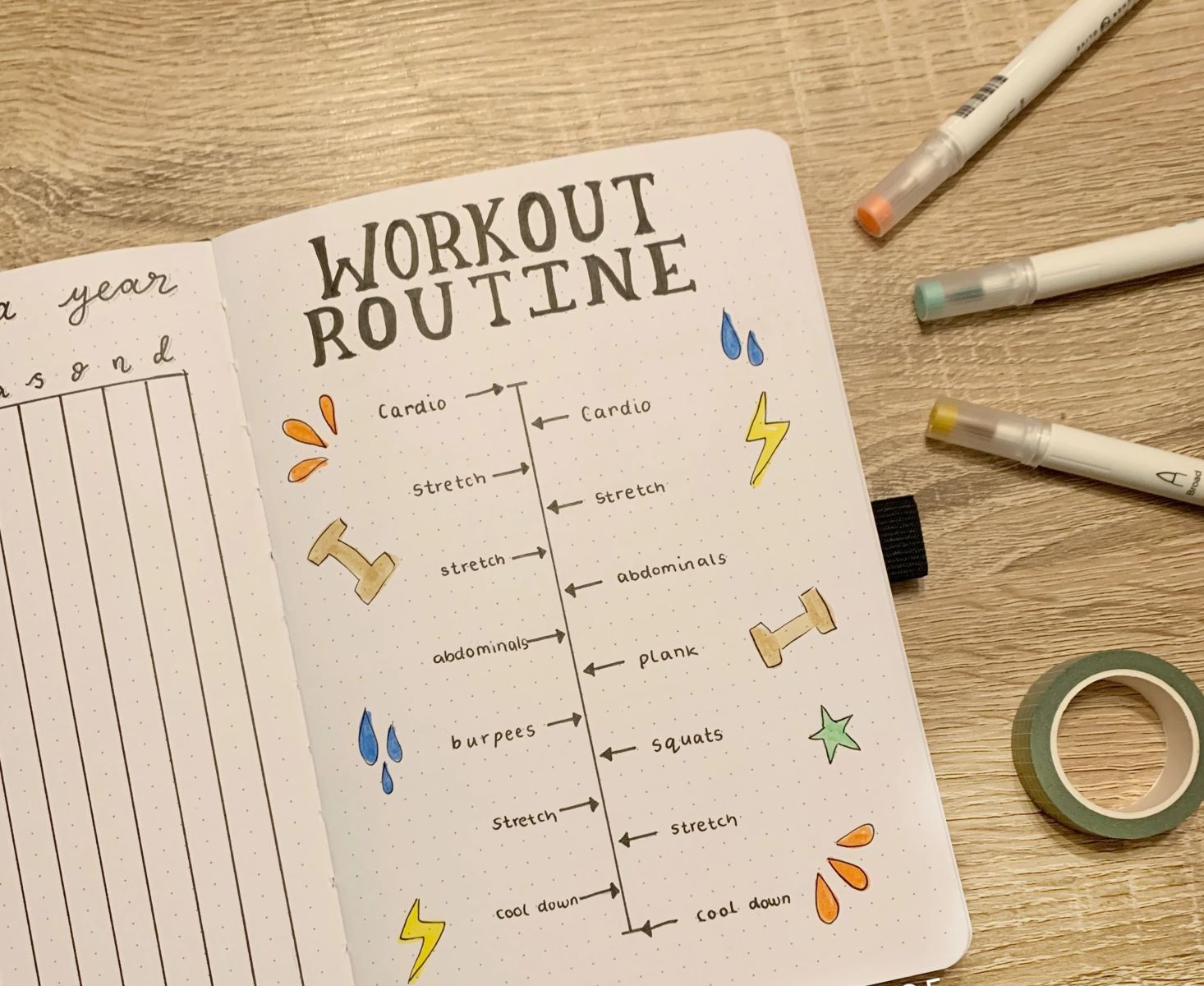

Featured
Why Do People Workout
Modified: January 2, 2024
Discover why people workout and the benefits they gain from physical activity. Explore articles and insights on fitness, health, and wellness in our featured collection.
Introduction
Welcome to the world of fitness and exercise, where people from all walks of life come together with a common goal: to improve their well-being. But have you ever wondered why people choose to workout? What motivates them to lace up their sneakers, hit the gym, or engage in physical activity? In this article, we will explore the various reasons why people dedicate their time and effort to exercise.
Exercise has become an integral part of our modern lifestyle, and for good reason. The benefits of regular physical activity extend far beyond just the physical realm. Engaging in exercise has been proven to have a positive impact on our mental, emotional, and social well-being as well. From managing weight to boosting self-confidence, exercise offers a plethora of advantages.
So, strap on your fitness gear and join us as we delve into the fascinating world of why people choose to workout. From improved health to increased energy levels, let’s explore the amazing benefits that exercise has to offer.
Health Benefits of Exercise
Regular exercise is often touted as a key component of a healthy lifestyle, and for good reason. Engaging in physical activity comes with a wide range of health benefits. From reducing the risk of chronic diseases to improving overall well-being, exercise plays a vital role in maintaining optimal health.
One of the primary benefits of exercise is its positive impact on cardiovascular health. Engaging in aerobic activities such as running, cycling, or swimming helps strengthen the heart and improve blood circulation. Regular exercise can reduce the risk of developing conditions such as heart disease, stroke, and high blood pressure.
Exercise also plays a crucial role in maintaining a healthy weight. By burning calories and increasing metabolism, physical activity helps in weight management. It helps to build lean muscle mass while reducing excess body fat. Combined with a balanced diet, exercise can contribute to maintaining a healthy body weight and reducing the risk of obesity.
Furthermore, regular exercise can significantly enhance the body’s immune system, making it stronger and more resilient to diseases and infections. Exercise increases the circulation of white blood cells and antibodies, which help to fight off harmful pathogens. This leads to a reduced risk of certain illnesses, such as colds, flu, and even some types of cancer.
In addition to physical health benefits, exercise is also beneficial for mental well-being. Physical activity releases endorphins, also known as “feel-good” hormones, which can help alleviate symptoms of stress, anxiety, and depression. Regular exercise has been shown to improve mood, boost self-esteem, and enhance cognitive function.
Lastly, exercise is essential for maintaining strong bones and joints. Weight-bearing exercises like walking, jogging, and weightlifting help to increase bone density, preventing the onset of osteoporosis and reducing the risk of fractures. Strengthening the muscles around the joints through exercise can also help to alleviate pain caused by conditions such as arthritis.
With its wide range of health benefits, it is clear why exercise is an essential aspect of a healthy lifestyle. From cardiovascular health to weight management, disease prevention to mental well-being, engaging in regular physical activity is a powerful tool for improving overall health and well-being.
Physical Fitness and Stamina
When it comes to exercise, one cannot overlook the significant impact it has on physical fitness and stamina. Regular exercise helps to improve endurance, strength, and overall physical performance. Whether you’re an athlete, a fitness enthusiast, or simply looking to improve your daily activities, exercise is essential for building and maintaining physical fitness.
Engaging in aerobic exercises such as running, swimming, or cycling helps to increase cardiovascular endurance. This means that your heart and lungs become more efficient at delivering oxygen to your muscles, allowing you to sustain physical activity for longer periods. Over time, your stamina will improve, allowing you to participate in activities with greater ease and energy.
In addition to cardiovascular endurance, exercise is essential for developing muscular strength and endurance. Incorporating resistance training, such as weightlifting or bodyweight exercises, helps to build strong muscles and increase overall strength. This can be beneficial not only for athletic performance but also for performing everyday tasks with ease and reducing the risk of injuries.
Moreover, exercise promotes flexibility and improves joint mobility. Incorporating stretching exercises into your fitness routine can help increase your range of motion, making daily movements smoother and preventing muscle imbalances. Flexibility is vital for maintaining good posture, preventing injuries, and ensuring that your body moves efficiently.
Regular exercise also promotes weight management, which is crucial for overall physical fitness. Maintaining a healthy weight helps to reduce the strain on your joints, improve agility, and enhance overall mobility. It can also contribute to better balance and coordination, reducing the risk of falls and injuries.
Lastly, exercise can enhance your overall energy levels and combat fatigue. It may seem counterintuitive, but engaging in physical activity actually boosts energy levels rather than depleting them. Exercise increases blood flow and oxygen delivery to the muscles and tissues, resulting in improved energy and productivity throughout the day.
By incorporating regular exercise into your routine, you can experience significant improvements in physical fitness and stamina. From increased endurance to enhanced strength and flexibility, exercise plays a vital role in helping you feel stronger, more energized, and ready to tackle any physical challenge that comes your way.
Weight Management
In today’s world, where sedentary lifestyles and unhealthy dietary choices are prevalent, weight management has become a significant concern for many individuals. Exercise plays a crucial role in achieving and maintaining a healthy weight, making it an essential component of any weight management plan.
Regular physical activity helps to burn calories, which is essential for weight loss. When combined with a proper diet, exercise creates a calorie deficit, wherein your body burns more calories than it consumes. This deficit leads to weight loss over time, as the body taps into its fat stores for energy.
In addition to calorie expenditure, exercise also helps to boost metabolism, which is the rate at which your body burns calories at rest. Engaging in activities that increase heart rate and muscle engagement, such as cardiovascular exercises and strength training, can elevate your metabolism even after the workout session, resulting in more calories burned throughout the day.
Furthermore, exercise helps to improve body composition by promoting the development of lean muscle tissue. Lean muscle mass is metabolically active, meaning it requires more energy to maintain compared to fat tissue. By building and maintaining lean muscle, exercise helps to increase the body’s overall calorie-burning capacity, even during periods of rest.
Exercise also plays a crucial role in preventing weight regain after initial weight loss. It helps to preserve muscle mass while targeting fat loss, which is essential for maintaining a healthy weight in the long term. Regular exercise is also associated with better weight maintenance success and improved weight loss outcomes in those who have already achieved significant weight loss.
Aside from weight loss and weight maintenance, regular exercise can also reshape the body, leading to improved body composition. Even if the scale may not show significant changes, exercise can help to reduce body fat and increase muscle tone, resulting in a leaner and more sculpted physique.
It is important to note that exercise alone may not be sufficient for weight management. A balanced and healthy diet is also crucial for achieving weight loss goals. However, exercise serves as a powerful tool to enhance weight loss efforts and ensure long-term weight management success.
By incorporating regular exercise into your routine, along with a healthy diet, you can successfully achieve and maintain a healthy weight. Exercise not only helps to burn calories and boost metabolism, but also plays a vital role in maintaining a lean body composition and preventing weight regain. So lace up your sneakers and get moving toward your weight management goals!
Disease Prevention
Exercise is often referred to as the “magic pill” for disease prevention, and for good reason. Engaging in regular physical activity is one of the most effective ways to reduce the risk of developing various chronic diseases and conditions.
Cardiovascular diseases, such as heart disease and stroke, are leading causes of death worldwide. Fortunately, exercise plays a significant role in preventing these conditions. Regular physical activity helps to lower blood pressure, reduce bad cholesterol levels, and improve blood circulation. It also strengthens the heart muscle, making it more efficient at pumping blood. By incorporating aerobic exercises into your routine, such as brisk walking, cycling, or swimming, you can significantly reduce the risk of cardiovascular diseases.
Type 2 diabetes is another prevalent chronic disease that can be prevented or managed through exercise. Physical activity helps to improve insulin sensitivity, allowing your body to use glucose effectively. This helps to regulate blood sugar levels and reduces the risk of developing diabetes. For those already diagnosed with diabetes, exercise can help to control blood sugar levels and improve overall glycemic control.
Exercise is also beneficial in reducing the risk of certain types of cancer. Numerous studies have shown that regular physical activity is associated with a decreased risk of developing colon, breast, and lung cancers. Exercise helps to maintain a healthy body weight, lower levels of inflammation, boost the immune system, and regulate hormone levels, all of which contribute to reducing cancer risk.
Osteoporosis, a condition characterized by weakened bones, is prevalent, especially among older adults. Weight-bearing exercises, such as walking and weightlifting, help to improve bone density and reduce the risk of fractures. Engaging in regular exercise also helps to strengthen the muscles around the joints, reducing the risk of falls and injuries in individuals with osteoporosis or osteoarthritis.
Exercise has even been shown to have a protective effect against mental health conditions. It can reduce the risk of developing depression and anxiety, as physical activity stimulates the release of endorphins and other chemicals that promote a positive mood. Regular exercise can also help to alleviate symptoms of existing mental health conditions, improving overall well-being.
The list of diseases that can be prevented or managed through exercise goes on, including conditions such as obesity, metabolic syndrome, and even cognitive decline and dementia. By making exercise a regular part of your lifestyle, you can significantly reduce the risk of developing these chronic diseases and improve your overall health and well-being.
Mental Health
When we think of exercise, we often focus on its physical benefits. However, the impact of exercise on our mental health should not be overlooked. Engaging in regular physical activity has been shown to have profound positive effects on mental well-being and emotional balance.
Exercise stimulates the release of endorphins, neurotransmitters in the brain that are often referred to as “feel-good” hormones. Endorphins help to improve mood, reduce stress, and alleviate symptoms of depression and anxiety. Regular exercise has been shown to have antidepressant and anxiolytic effects, making it a natural and effective way to improve mental health.
In addition to endorphins, exercise increases the production of other brain chemicals such as serotonin, dopamine, and norepinephrine, all of which play a crucial role in regulating mood and emotions. These chemicals help to enhance feelings of happiness, pleasure, and overall well-being. Exercise has been found to have similar effects on the brain as some medications prescribed for mental health conditions, but without the potential side effects.
Engaging in physical activity has shown to improve cognitive function and enhance memory and learning capabilities. Exercise stimulates the growth of new brain cells and increases blood flow and oxygen delivery to the brain, which can enhance concentration, focus, and overall cognitive performance. Regular exercise has also been linked to a reduced risk of cognitive decline and age-related neurodegenerative diseases, such as Alzheimer’s disease.
Exercise is not only beneficial for individuals who may already be experiencing mental health issues but also for those who simply want to improve their overall mental well-being. It can help to boost self-esteem and self-confidence, as physical activity provides a sense of accomplishment and mastery over challenges. Meeting exercise goals and seeing physical improvements can have a profound positive effect on one’s self-perception.
Furthermore, exercise can provide an outlet for stress and tension. Physical activity helps to reduce the levels of stress hormones, such as cortisol, in the body. It helps to alleviate feelings of anxiety and can provide a distraction from negative thoughts and worries. Whether it’s going for a run, hitting a punching bag, or practicing yoga, exercise can be a powerful stress management tool.
In our fast-paced and often stressful lives, exercise offers a natural and holistic approach to maintaining and improving mental health. By incorporating regular physical activity into your routine, you can experience the benefits of improved mood, reduced stress, enhanced cognitive function, and increased overall well-being.
Increased Energy Levels
Are you feeling tired and sluggish? Looking for a natural way to boost your energy levels? Look no further than exercise! Engaging in regular physical activity can provide a much-needed energy boost and help combat feelings of fatigue.
It may sound counterintuitive, but exercise actually increases energy levels rather than depleting them. Physical activity stimulates the production of endorphins, neurotransmitters that promote a sense of well-being and provide an energizing effect. These endorphins help to combat feelings of fatigue and can leave you feeling more alert and focused.
Regular exercise has been shown to improve cardiovascular fitness and overall endurance. This means that as your fitness levels improve, you will be able to perform physical activities with less effort and without feeling as quickly fatigued. Your body becomes more efficient at delivering oxygen and nutrients to your muscles, resulting in increased stamina and prolonged endurance.
Exercise also helps to improve sleep quality, which in turn contributes to increased energy levels throughout the day. Physical activity promotes the release of stress and tension, allowing for a more restful and rejuvenating sleep. By getting enough quality sleep, your body is better equipped to restore energy levels and function optimally during wakefulness.
Furthermore, engaging in regular exercise helps to regulate hormone levels in the body. Exercise increases the production of serotonin, a neurotransmitter that promotes feelings of happiness and well-being. It also plays a role in the production of other hormones such as cortisol, which regulates stress, and melatonin, which is important for sleep regulation. Balanced hormone levels contribute to overall energy balance and a more consistent and stable energy throughout the day.
Physical activity also improves circulation and increases blood flow to the brain and muscles. This enhanced blood flow delivers nutrients and oxygen to the body’s tissues, providing a renewed sense of vitality and increased energy levels. Improved circulation also helps to remove waste products and toxins from the body, further enhancing overall energy and well-being.
Lastly, exercise helps to combat sedentary behavior, which can contribute to feelings of lethargy and low energy. Physical inactivity can lead to muscle weakness, decreased metabolism, and reduced overall energy expenditure. By incorporating regular exercise into your routine, you break free from the sedentary trap and activate your body, leading to increased energy and improved overall vitality.
So, if you find yourself in need of an energy boost, don’t reach for another cup of coffee; put on your workout gear and get moving! Regular exercise can provide you with the energy and vitality needed to conquer your day and live life to the fullest!
Social Interaction and Support
Exercise is not only a solitary activity; it can also serve as a platform for social interaction and support. Whether you’re hitting the gym, joining a group fitness class, or participating in team sports, exercise provides ample opportunities to connect with others and build meaningful relationships.
Engaging in physical activity with others can lead to a sense of camaraderie and community. It provides a shared experience and a common goal, fostering a sense of belonging and connection. Meeting like-minded individuals who share your passion for fitness can be motivating and inspiring, as you can support and encourage one another on your fitness journeys.
Group exercise classes, such as Zumba, yoga, or spinning, offer a fun and social environment where you can meet new people and form friendships. Working out together, sharing challenges and achievements, and cheering each other on can create a sense of teamwork and camaraderie. This can help to alleviate feelings of loneliness and isolation, contributing to improved mental well-being.
Participating in team sports takes social interaction to another level. Team sports provide an opportunity to work together towards a common goal, fostering a sense of unity and cooperation. Being part of a team can boost self-esteem and provide a support system both on and off the field. Engaging in sports can create lasting friendships and offer a sense of belonging to a community of individuals who share your love for the game.
Exercise can also be a social outlet for individuals of all ages. It provides an opportunity to bond with friends, family members, or colleagues while engaging in a shared activity. Activities such as going for walks, biking, or hiking together not only provide an avenue for exercise but also allow for quality time and conversations with loved ones.
Additionally, exercise communities and online fitness groups provide virtual spaces for social interaction and support. These communities allow individuals to connect with others who have similar fitness goals, share advice and experiences, and provide support and encouragement. Engaging with these communities can help to stay motivated, accountable, and inspired on your fitness journey.
Exercise serves as a powerful tool not only for improving physical fitness but also for promoting social interaction and support. By participating in group activities, team sports, or joining fitness communities, you can build connections, find a sense of belonging, and create a strong support system. So, lace up your shoes, join a class, or invite a friend for a workout, and experience the power of social interaction in exercise.
Boosted Confidence and Self-Esteem
Exercise has the incredible power to boost confidence and improve self-esteem. Engaging in regular physical activity can have a transformative effect on how we perceive ourselves, both physically and mentally.
Physical changes resulting from exercise, such as weight loss, improved muscle tone, and increased strength, can have a significant impact on self-perception. As we start to see improvements in our physical appearance, we may feel more confident in our own skin. Achieving fitness goals and reaching milestones during exercise can provide a sense of accomplishment and pride, further enhancing self-confidence.
Exercise also improves body awareness and body image. Through physical activity, we become more connected to our bodies, appreciating their capabilities and strengths. This increased body awareness helps to shift the focus from solely external appearance to overall health and well-being. As we become more in tune with our bodies and what they can achieve, our confidence in our physical abilities grows.
Moreover, exercise has a powerful effect on mental well-being, which in turn contributes to boosted confidence and self-esteem. Regular physical activity stimulates the release of endorphins, neurotransmitters that are often referred to as “feel-good” hormones. Endorphins help to elevate mood, reduce stress, and promote a sense of well-being. This increased mental well-being translates to improved self-esteem and a more positive self-image.
Exercise also helps to alleviate symptoms of anxiety and depression, conditions that can greatly impact self-confidence. By engaging in physical activity, we can experience relief from symptoms, gain a sense of control over our mental health, and feel empowered to take charge of our overall well-being. As we overcome challenges and push ourselves to new physical limits, we build resilience and confidence in our ability to overcome obstacles.
Participating in group exercise classes or team sports can also contribute to increased confidence and self-esteem. Being part of a supportive and encouraging group environment allows individuals to feel accepted, valued, and respected. Positive interactions and feedback from others can boost confidence and reinforce a sense of self-worth.
Furthermore, regular exercise provides opportunities to set and achieve personal goals, whether it’s completing a 5K race, lifting heavier weights, or mastering a new yoga pose. Accomplishing these goals helps to build confidence in our abilities, proving that we are capable of overcoming challenges and pushing beyond our limits.
Exercise provides a powerful platform for personal growth and self-improvement, positively impacting self-confidence and self-esteem. Whether it’s through physical changes, improved mental well-being, group dynamics, or goal attainment, regular physical activity has the potential to transform how we perceive ourselves and our capabilities.
Stress Relief
In today’s fast-paced and demanding world, stress has become an inevitable part of our lives. However, exercise offers a natural and effective way to combat stress and promote relaxation. Engaging in regular physical activity provides a much-needed outlet and helps to reduce the negative effects of stress on both our bodies and minds.
Exercise has been proven to stimulate the release of endorphins, neurotransmitters in the brain that act as natural painkillers and mood boosters. These endorphins help to alleviate symptoms of stress, anxiety, and depression. The surge of endorphins during and after exercise can create a sense of euphoria and well-being, effectively reducing tension and promoting relaxation.
Physical activity also helps to lower the levels of stress hormones in the body, such as cortisol. Chronically elevated cortisol levels can have detrimental effects on our health and well-being, leading to an increased risk of chronic diseases, weight gain, and impaired immune function. Regular exercise helps to regulate cortisol levels, reducing the negative impact of stress on our bodies.
Engaging in exercise provides a distraction from the stressors of daily life. By focusing on the physical movements and the sensations in your body, you can temporarily shift your attention away from worries and negative thoughts. This mental shift allows for a break from the stress cycle, providing a sense of relief and relaxation.
Exercise also offers a platform for emotional release. Physical activity helps to channel negative emotions, frustrations, and pent-up energy in a healthy and productive way. Whether it’s taking a vigorous run, hitting a punching bag, or engaging in a high-intensity workout, exercise allows for the release of built-up tension, leaving you feeling calmer and more centered.
In addition to the immediate relief, regular exercise provides long-term benefits in managing stress. Engaging in physical activity on a consistent basis helps to build resilience to stress and increases our overall capacity to handle challenging situations. By challenging ourselves physically and pushing our limits, we develop a greater sense of confidence and control over stressors in our lives.
Exercise can also provide a sense of routine and structure, which can be comforting and help to manage stress levels. Establishing a exercise routine and making it a regular part of your day can create a sense of stability and provide a much-needed break from the chaos and uncertainties of life.
Ultimately, exercise serves as a powerful tool for stress relief. By engaging in regular physical activity, you can reduce the negative effects of stress, promote relaxation, and enhance your overall well-being. So, lace up your shoes, hit the gym, or go for a jog and experience the transformative effect of exercise on stress reduction.
Improved Sleep
Sleep is a vital aspect of overall health and well-being, and exercise plays a significant role in promoting healthy sleep patterns. Engaging in regular physical activity has been shown to improve sleep quality, reduce the time it takes to fall asleep, and enhance overall sleep duration.
Exercise helps to regulate the body’s circadian rhythm, the internal clock that regulates our sleep-wake cycle. Regular physical activity promotes a more consistent sleep schedule, making it easier to fall asleep and wake up at desired times. Consistency in sleep-wake patterns helps to synchronize the body’s natural sleep cycle, improving the overall quality of sleep.
Physical activity has been found to stimulate changes in brain chemistry that promote sleep. Exercise increases the production of serotonin, a neurotransmitter that helps regulate mood and sleep. It also promotes the release of endorphins, which can contribute to relaxation and a sense of well-being. These chemical changes in the brain help to promote deep and restorative sleep.
Aside from the chemical effects, exercise also helps to tire out the body, making it easier to fall asleep at night. Engaging in physical activity during the day helps to expend excess energy and reduce restlessness that can interfere with sleep. It also promotes muscle relaxation, reducing physical tension and promoting a state of relaxation conducive to sleep.
Exercise has been shown to alleviate symptoms of common sleep disorders such as insomnia and sleep apnea. Regular physical activity can help individuals with insomnia fall asleep faster, stay asleep longer, and experience a more restful sleep. For those with sleep apnea, exercise can help to improve breathing patterns and reduce the severity of symptoms.
Furthermore, exercise can act as a natural remedy for stress and anxiety, which are common contributors to sleep problems. Engaging in physical activity helps to reduce stress levels and promote relaxation, creating a peaceful mindset before bedtime. Exercise also helps to regulate the production of cortisol, the “stress hormone,” and increases the production of endorphins, contributing to improved mood and reduced anxiety.
It’s important to note that the timing of exercise can also influence sleep. While exercise can be beneficial for sleep, intense physical activity close to bedtime may have a stimulating effect, making it harder to fall asleep. It is recommended to finish exercise at least a few hours before bedtime to allow for a period of relaxation and wind-down before sleep.
Incorporating regular exercise into your routine can lead to improved sleep quality and duration. By promoting a more consistent sleep-wake cycle, enhancing relaxation, and reducing stress, exercise serves as a natural and effective way to achieve a restful and rejuvenating night’s sleep.
Conclusion
Exercise has numerous benefits that extend beyond physical fitness. Engaging in regular physical activity offers a wide range of advantages for our overall well-being, including improved health, increased energy levels, boosted confidence, and reduced stress levels.
The health benefits of exercise are undeniable. It helps to improve cardiovascular health, manage weight, and reduce the risk of chronic diseases such as diabetes and certain types of cancer. Exercise also plays a crucial role in maintaining physical fitness and stamina, enhancing strength, endurance, and flexibility.
Furthermore, exercise contributes to mental health by releasing endorphins, promoting positive mood, and reducing symptoms of anxiety and depression. It provides an outlet for stress relief, promotes better sleep, and enhances cognitive function and memory.
Exercise is not just a solitary activity; it can also provide opportunities for social interaction and support. Whether it’s participating in group exercise classes, team sports, or joining fitness communities, exercise offers a platform for forming connections, fostering a sense of belonging, and building a support system.
Engaging in regular physical activity also boosts confidence and self-esteem. As we see improvements in our physical appearance and achieve fitness goals, our self-perception improves, contributing to a more positive self-image. Exercise also helps to cultivate resilience, empowers us to overcome challenges, and enhances our overall sense of self-worth.
In conclusion, exercise is a powerful tool for improving our physical and mental well-being. It provides a natural means to achieve and maintain optimal health, offering benefits such as disease prevention, increased energy levels, stress relief, and improved sleep. By incorporating regular physical activity into our lives, we can reap the countless rewards that exercise has to offer, leading to a healthier, happier, and more balanced lifestyle. So, lace up your shoes, embrace the joy of movement, and embark on a journey of better health and well-being through exercise.








